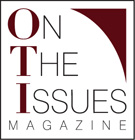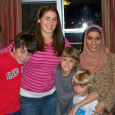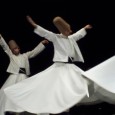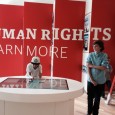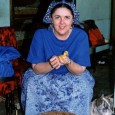Two decades ago, an encounter with a now-famous global trailblazer helped point me on a path of international travel from which I’ve never looked back. The lessons I’ve learned on the road have informed my career choice, my activism, and even my willingness to be open to perfect strangers.
Recently I began to pass along the simple delights of travel to my two young sons. If their generation doesn’t learn to cross borders and become citizens of the world, what are the prospects for solving the critical issues facing the planet?
Crossing borders aboard the Dogu Express
The Dogu Ekspresi train runs from Turkey’s far eastern border near Armenia to Istanbul in just under 40 hours. Earlier this year, my husband and I, vacationing with our children, climbed aboard in Central Turkey for the train’s remaining 18-hour route to Istanbul.
 We were warned that it is one of Turkey’s slowest and oldest trains. Perhaps we’d be better off considering an hour and a half flight back to Istanbul? Or the 10-hour bus ride, at the same price?
We were warned that it is one of Turkey’s slowest and oldest trains. Perhaps we’d be better off considering an hour and a half flight back to Istanbul? Or the 10-hour bus ride, at the same price?
We’d also heard that there were warning signs in the sleeping car reading: “Recently some persons with bad intentions have approached our passengers and offered them food or drink containing sleeping drugs, and have then stolen their valuables…. We wish you a pleasant journey.”
The truth is, I had agreed to this meandering mode of travel because of the children. It’s hard to describe the light in our six- and ten-year old boys’ eyes at the very thought of a sleeper car (with bunk beds!) and a dining car (with tablecloths!)
Plus, I’d warmed up to the idea of nearly a day on the train after having met a fascinating and friendly family from Iran who had crossed the border into Turkey and taken the Dogu Express from its starting point in Kars.
Indeed, one of my chief criteria in selecting travel destinations is the opportunity to interact with people from cultures and backgrounds I don’t usually encounter at home. If interesting people like that were on this “express,” how could it not be a good idea?
On the day of our departure, the train was already over an hour delayed. We waited in the Kayseri station as the boys curiously eyed the automatic guns of the dozen soldiers standing about, and I strategically lifted our bags to higher ground while the janitor threw buckets of soapy water over the grooved marble floor.
On the Train
 Once the train finally pulled into the station and we ran along the track to find car nine, we were greeted enthusiastically by an older woman wearing a headscarf and fingering her worn prayer beads. She took my hand, smiling, and starting speaking in rapid-fire Turkish.
Once the train finally pulled into the station and we ran along the track to find car nine, we were greeted enthusiastically by an older woman wearing a headscarf and fingering her worn prayer beads. She took my hand, smiling, and starting speaking in rapid-fire Turkish.
Pretty much the only thing I can say in Turkish is, “I’m sorry, but I don’t speak Turkish.” I gave it a try. She laughed heartily and continued talking. Maybe she was speaking Farsi? Armenian? Eventually she waved goodbye and went back to her compartment.
A few hours later, I was sitting alone while my husband and the boys explored the train, when she came back. She smiled and sat down in the empty seat right next to me. And she started speaking quickly again, as if we were old friends.
I took out our Turkish phrase book and tried to make conversation.
“Where are you from? I’m from America.” She just laughed and continued right on.
“Where are you traveling to?” Nothing. “Istanbul?” Now she was nodding her head, still smiling and talking.
This went on for a while longer, and I figured I’d join in the only way I knew how.
So, in English, I told her about my life. How we were on something called spring break. How my husband looks Turkish, but his family originally came from Russia. That my parents and my husband’s parents live not-too-far from us and that we see them often. And how my brothers and their families are nearby and how that might all seem like we live in a small village, but we’re really from New York.
She listened along, nodding vigorously as if she understood every word I said. Then she told me her story. I offered her a bag of raisins we’d bought in the outdoor market in Göreme. She accepted, patting me on the shoulder. Then she went back to her compartment and returned minutes later with a half-drunk bottle of orange soda. We joined hands for a moment and said goodnight as the sun set over the hills outside our window.
Years ago I taped a phrase by the Austrian philosopher Wittgenstein to my college German folder: “The limits of my language mean the limits of my world.” At the time, I took its meaning more literally than Wittgenstein ever intended, believing that a facility with languages could expand my understanding of the world. While this is no doubt true, the conversation with my new travel companion had defied the boundary of words entirely.
A day is a long time to spend on a train, but the interaction left me feeling more refreshed and connected than I’d been in a while.
Sound advice from President Obama’s mother
I received a lot of encouragement to travel “off-the-beaten path” by following the advice of an academic whose approach to education went far beyond the world’s ivory towers.
It was 1994 and I was happily ensconced in a post-graduate school internship at the United Nations, helping to develop materials about revenue-generating activities for low-income women. Internships can either be monotonous times filing away a supervisor’s paperwork or stepping stones leading to exciting new opportunities.
As luck would have it, that position brought me in contact with Ann Dunham, a pioneer in microfinance who helped set me on a new direction for my career — and my life.
 When I met her, Ann was leading a newly formed International Coalition on Women in Credit in preparation for the UN Beijing Women’s Summit in 1995. She and her colleagues at Women’s World Banking understood communications in a way that was pretty rare at the time.
When I met her, Ann was leading a newly formed International Coalition on Women in Credit in preparation for the UN Beijing Women’s Summit in 1995. She and her colleagues at Women’s World Banking understood communications in a way that was pretty rare at the time.
Ann felt that she would have the chance of convincing the international community gathered in Beijing of the benefits of lending small sums to poor women if she could help them to see the results for themselves.
In other words, she wanted her audience to look into the faces of poor women instead of merely hearing economic statistics about successful programs.
Knowing that I had been involved in producing videos, she asked me to edit two pieces for broadcast in Beijing, featuring microcredit programs in Nepal and Bangladesh.
“Make sure it’s about the women,” she instructed.
I admired Ann for her wandering spirit as an American anthropologist whose PhD research led her to Indonesia to examine the role of women in cottage industries. When my video editing project was finished, she encouraged me to follow my dream to travel to rural Bangladesh and study the granddaddy of all microfinance groups, the Grameen Bank. It would help ground my ideals in real life experience, I remember her saying. And while I was there, she wanted me to produce a longer film about a poverty alleviation program in Dhaka to air at the Beijing Conference. I gladly accepted the challenge.
It’s hard to put into words how fortuitous this was for me. Going to Bangladesh and producing films for Ann married my dual loves of international campaigns for justice and communications. Finally I had a tangible way of combining the two.
By the time I made it back to the United States, Ann, only 53 years old, was living out her final days with cancer in Hawaii. She never made it to Beijing.
Now that the world knows Ann as the mother of President Barack Obama, her enormous contributions are being given the recognition she deserves.
And from the perspective of this former intern, I am grateful to Ann for opening my eyes to the imperative of learning directly from the source – from the people themselves, no matter where they may be.
Leaving the world a little better than you found it
In the 1940s, Robert Stephenson Smyth Baden-Powell — who was credited with founding the Scout Movement — wrote a letter found in his desk drawer after his death. Within it was his now-famous advice to Scouts around the globe: “Try and leave this world a little better than you found it.”
When we take to the road, there’s no telling what we’ll put into motion
Baden-Powell’s words represent a worthy aspiration for anyone concerned about the fate of the planet and the seemingly intractable issues of our time – including poverty, disease, conflict and climate change.
But when we brush off our passports and take to the road with a few essentials, there’s no telling what change we’ll put into motion. For some, risk-taking may mean trekking in a remote land. For others, risk-taking may be acquiring a new skill set or finding meaningful employment overseas. And for many more, it may mean developing a one-on-one relationship that surmounts language or cultural differences, even right in their own backyard.
An enormous map of the world covers a wall in my children’s bedroom. Many nights since our trip to Turkey, they point to a new area and ask me what it’s like there. Then, as their eyelids grow heavier and their breathing deepens, I imagine that their dreams are carrying them wherever they want to go.
Travel well, little ones. May you see the world not only as it is, but as it could be.
